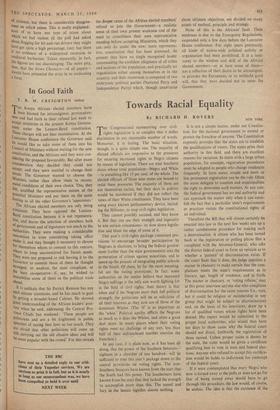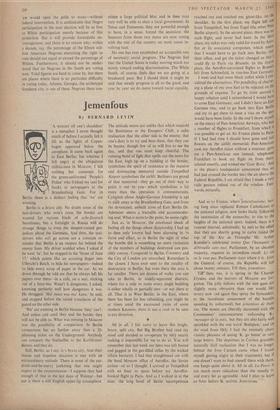Towards Racial Equality
By RICHARD H. ROVERE
NEW YORK
THE Congressional manceuvring over civil- rights legislation is so complex that it defies elucidation in any reasonable number of words. Moreover, it is boring. The basic situation, though, is a quite simple one. The majority of elected officials are responsive to the pressures for securing increased rights to Negro citizens by means of legislation. There are nine Southern states whose total population—Negro and White —is something like 13 per cent, of the whole. The elected officials of tliose nine states are bound to resist these pressures. The majority of them are not themselves racists, but their days in politics would be numbered if they did not reflect the views of their White constituents. They have been using every known parliamentary device, includ- ing the filibuster, to stop civil-rights legislation.
They cannot possibly succeed, and they know it. But they can use their strength and ingenuity to win certain concessions—to slow down legisla- tion and blunt the edge of some of it.
This year's civil-rights package contained pro- visions to encourage broader participation by Negroes in elections, to bring the federal govern- ment (rather than the state governments) into the prosecution of crimes against minorities, and to speed up the process of integrating public schools in the South. Of these, by far the most meaning- ful are the voting provisions. In fact, some authorities on the matter believe that increased Negro suffrage is the only aim worth fighting for in the field of civil rights; their theory is that when and if the Negroes exert their full political strength, the politicians will be as solicitous of all their interests as they now are of those of the dominant Whites. (The 'if' is as important as the 'when.' Political apathy afflicts the Negroes as much as it does the Whites, and often a good deal more. In many places where their voting rights meet no challenge of any sort, less than half of their enfranchised number exercise the franchise.) In any case, it is plain now, as it has been all along, that the power of the Southern Senators— eighteen in a chamber of one hundred—will be sufficient to trim this year's package down to the central provisions on voting rights. The non- Southern Senators have known from the start that the South had this power. The Southerners have known from the start that they lacked the strength to accomplish more than this. The sound and fury in the Senate signifies almost nothing. It is not a simple matter, under our Constitu- tion, for the national government to extend or protect the franchise of anyone. The Constitution expressly provides that the states are to establish the qualifications of voters. The slates prize their authority in this field, and there are excellent reasons for variation. In states with a large urban population, for example, registration procedures must be adapted to people who change residences frequently. In farm states, simple and more or less permanent registration can be the rule. Often the states delegate to counties and municipalities the right to determine such matters. At any rate, the federal government has no real authority and can approach the matter only when it can estab- lish the fact that a particular state's requii-ements or practices violate the constitutional rights of an individual.
Therefore the Bill that will almost certainly be enacted into law in the next few weeks sets up a rather cumbersome procedure for making such a determination. A citizen who has been turned back at the registration or polling places files a complaint with the Attorney-General, who asks the district federal court to form an opinion as to whether a 'pattern' of discrimination exists. If the court finds that it does, the judge appoints a master in chancery to make certain that the com- plainant meets the state's requirements as to literacy, age, length of residence, and so forth. The master in chancery, or 'voting referee,' may at this point interview anyone else who complains of discrimination for the same reasons (i.e., race, but it could be religion or membership in any group that might be subject to discrimination) and, on the basis of his interviews, draw up a list of qualified voters whose rights have been denied. His report would be submitted to the proper local authorities, who would then have ten days to show cause why the federal court should not direct, forthwith, the registration of those named. Unless proper cause is shown by the state, the voter would be given a certificate qualifying him to vote in state and federal elec- tions. Anyone who refused to accept This certifica- tion would be liable to indictment for contempt of the federal court.
If it were contemplated that every Negro who now is turned away at the polls or does not go for fear of being turned away would have to go through this procedure, the law would, of course, be useless. The idea is that the existence Of the
aw would open the polls to many—without federal intervention. It is unthinkable that Negro participation in the next election will be as free AS White participation merely because of this protection. But it will provide formidable en- couragement, and there is no reason why, within a decade, say, the percentage of the fifteen mil- lion American Negroes exercising the right to vote should not equal or exceed the percentage of Whites. Furthermore, it should not be under- stood that no Negroes in the South are voting now. Total figures are hard to come by, but there are places where there is no particular difficulty in voting today. Atlanta, Georgia, the archetypal Southern city. is one of these. Negroes there con- stitute a large political bloc and in time may very well be able to elect a local government. In Texas and Tennessee, they are powerful enough to have, in a sense, forced the secession; the Senators from those two states are now voting with the rest of the country on most issues in- volving race.
No one has ever established an acceptable rate of necessary social progress. The Negroes feel ' that the United States is today moving much too slowly toward ending discrimination. The White South, of course, feels that we are going at a breakneck pace. But I should think it might be said that steady progress is all to the good, and year by year we do move toward racial equality.



















































 Previous page
Previous page